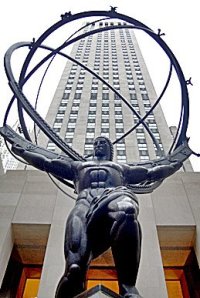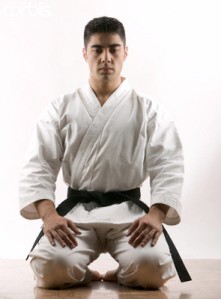





 Today, I see two main factions warring over the label “conservatism”: the traditionalists and the libertarians. Is there middle ground upon which the two sides can come together? Yes. And I will reason out my thoughts and arguments in two or three posts. For this post, I hearken back to Burkean Conservatism. In doing so, I argue that Edmund Burke and his strand of conservatism is the intellectual and philosophical forefather of post-WWII modern American conservatism. In fact, the roots of the label, “conservative”, or a party of restraint, can be traced directly back to Edmund Burke.
Today, I see two main factions warring over the label “conservatism”: the traditionalists and the libertarians. Is there middle ground upon which the two sides can come together? Yes. And I will reason out my thoughts and arguments in two or three posts. For this post, I hearken back to Burkean Conservatism. In doing so, I argue that Edmund Burke and his strand of conservatism is the intellectual and philosophical forefather of post-WWII modern American conservatism. In fact, the roots of the label, “conservative”, or a party of restraint, can be traced directly back to Edmund Burke.
Edmund Burke was an Irishman who rose quickly through the British political ranks. He first cut his teeth in British politics by writing for the Annual Register, an annual review of the political and cultural events of Europe. He eventually became the editor of the Register, which at that time was a highly successful and influential journal. His formal political career began when he was elected to the House of Commons where he quickly became an outspoken critic of Britain’s colonial imprudence in handling the American colonies and taking focused aim at Britain’s taxation of the colonies without proper representation. (Naturally, Edmund Burke and his traditionalist and libertarian philosophies were embraced by our country’s founding fathers, particularly by J.Madison and A.Hamilton, evidenced by their writings in the Federalist Papers.)
But probably most notable was Burke’s deep animus against the French Revolution (see book: Reflections on the French Revolution). Burke visited France in 1773 during which time he witnessed a country hobbling under serious financial problems and brimming with militant atheism. Upon return to Britian, Burke noted in an address to Parliament that “under the systematic attacks of these people, I see some of the props of good government already begin to fail…” (Reflections). Soon thereafter, mob violence in France grew and reached its peak with the mobs storming into Bastille on July 14, 1789. The Jacobins, under the leadership of Robespierre, took control and mandated that all cultural, legal, political, and religious institutions of France, including their figureheads, be immediately eradicated. (Wiki). By this point, Burke was convinced that the French Revolution was nothing like the American Revolution. The French Revolution was being driven by a force of evil.
Burke’s political philosophy was based on the ancient classical and Christian moral natural law. According to Burke, this natural law provided the precepts by which rulers ruled and used their power to protect of life, liberty, and property (a very familiar idea). Burke regarded the protection of private property as essential to the maintenance of freedom in society. He viewed freedom in the marketplace as vital to a fluid and vibrant society, but he also recognized that a legal apparatus that maintained this freedom was equally necessary – you couldn’t have one without the other. (see superb article: Edmund Burke and Adam Smith: Pioneers in the Field of Law and Economics) These views, boiled down, implied that rulers were held accountable to the Christian God and the natural laws, while being held accountable to his subjects through positive law (e.g. constitutional and contract laws), which, of course, derived largely from natural laws. Stated simply, virtue (quality of doing what is right and avoiding what is wrong) and freedom had to work in tandem for maximum prosperity.
Today, we see Burke’s moral values, derived from the religious traditions of Christianity, embodied by our social, legal, religious, and familial institutions (although such institutions are being threatened by the sturm and drang of a growing atheistic movement). Burke favored a strong presumption in favor of the validity of longstanding institutional traditions (Christianity) and hostility to rapid unfettered change. For Burke, conserving these institutions was critical and necessary. Burke also recognized that men were born evil and that the only way man could gain virtue was largely through the religious traditions of Christianity. This appreciation of the Christian tradition coupled with maximum individual freedom (a la small government, fiscal restraint, and other contemporary libertarian positions) is essentially Burkean conservatism.
This is core idea that the Republican Party must once again unambiguously embrace. Frank Meyer, a Christian libertarian, has articulated this goal brilliantly calling it “fusionism”, which I will discuss briefly in a subsequent post.
American Confucius
 Today, I see two main factions warring over the label “conservatism”: the traditionalists and the libertarians. Is there middle ground upon which the two sides can come together? Yes. And I will reason out my thoughts and arguments in two or three posts. For this post, I hearken back to Burkean Conservatism. In doing so, I argue that Edmund Burke and his strand of conservatism is the intellectual and philosophical forefather of post-WWII modern American conservatism. In fact, the roots of the label, “conservative”, or a party of restraint, can be traced directly back to Edmund Burke.
Today, I see two main factions warring over the label “conservatism”: the traditionalists and the libertarians. Is there middle ground upon which the two sides can come together? Yes. And I will reason out my thoughts and arguments in two or three posts. For this post, I hearken back to Burkean Conservatism. In doing so, I argue that Edmund Burke and his strand of conservatism is the intellectual and philosophical forefather of post-WWII modern American conservatism. In fact, the roots of the label, “conservative”, or a party of restraint, can be traced directly back to Edmund Burke.
Edmund Burke was an Irishman who rose quickly through the British political ranks. He first cut his teeth in British politics by writing for the Annual Register, an annual review of the political and cultural events of Europe. He eventually became the editor of the Register, which at that time was a highly successful and influential journal. His formal political career began when he was elected to the House of Commons where he quickly became an outspoken critic of Britain’s colonial imprudence in handling the American colonies and taking focused aim at Britain’s taxation of the colonies without proper representation. (Naturally, Edmund Burke and his traditionalist and libertarian philosophies were embraced by our country’s founding fathers, particularly by J.Madison and A.Hamilton, evidenced by their writings in the Federalist Papers.)
But probably most notable was Burke’s deep animus against the French Revolution (see book: Reflections on the French Revolution). Burke visited France in 1773 during which time he witnessed a country hobbling under serious financial problems and brimming with militant atheism. Upon return to Britian, Burke noted in an address to Parliament that “under the systematic attacks of these people, I see some of the props of good government already begin to fail…” (Reflections). Soon thereafter, mob violence in France grew and reached its peak with the mobs storming into Bastille on July 14, 1789. The Jacobins, under the leadership of Robespierre, took control and mandated that all cultural, legal, political, and religious institutions of France, including their figureheads, be immediately eradicated. (Wiki). By this point, Burke was convinced that the French Revolution was nothing like the American Revolution. The French Revolution was being driven by a force of evil.
Burke’s political philosophy was based on the ancient classical and Christian moral natural law. According to Burke, this natural law provided the precepts by which rulers ruled and used their power to protect of life, liberty, and property (a very familiar idea). Burke regarded the protection of private property as essential to the maintenance of freedom in society. He viewed freedom in the marketplace as vital to a fluid and vibrant society, but he also recognized that a legal apparatus that maintained this freedom was equally necessary – you couldn’t have one without the other. (see superb article: Edmund Burke and Adam Smith: Pioneers in the Field of Law and Economics) These views, boiled down, implied that rulers were held accountable to the Christian God and the natural laws, while being held accountable to his subjects through positive law (e.g. constitutional and contract laws), which, of course, derived largely from natural laws. Stated simply, virtue (quality of doing what is right and avoiding what is wrong) and freedom had to work in tandem for maximum prosperity.
Today, we see Burke’s moral values, derived from the religious traditions of Christianity, embodied by our social, legal, religious, and familial institutions (although such institutions are being threatened by the sturm and drang of a growing atheistic movement). Burke favored a strong presumption in favor of the validity of longstanding institutional traditions (Christianity) and hostility to rapid unfettered change. For Burke, conserving these institutions was critical and necessary. Burke also recognized that men were born evil and that the only way man could gain virtue was largely through the religious traditions of Christianity. This appreciation of the Christian tradition coupled with maximum individual freedom (a la small government, fiscal restraint, and other contemporary libertarian positions) is essentially Burkean conservatism.
This is core idea that the Republican Party must once again unambiguously embrace. Frank Meyer, a Christian libertarian, has articulated this goal brilliantly calling it “fusionism”, which I will discuss briefly in a subsequent post.
American Confucius